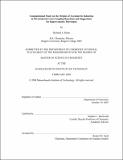Computational study on the origins of asymmetric induction in Pd-catalyzed cross-coupling reactions and suggestions for improvements thereupon
Author(s)
Huhn, Richard A. (Richard Andrew)
DownloadFull printable version (16.61Mb)
Other Contributors
Massachusetts Institute of Technology. Dept. of Chemistry.
Advisor
Stephen L. Buchwald.
Terms of use
Metadata
Show full item recordAbstract
The origins of asymmetric induction in the Suzuki-Miyaura cross coupling reaction are investigated computationally with density functional theory. Monophosphine-bound palladium complexes are analyzed in the context of oxidative addition to aryl halides, and ligands are explored in terms of steric and electronic effects relevant to oxidative addition. As one of the most successful ligands to date for the asymmetric Suzuki reaction, KenPhos is given substantial attention and subjected to detailed structural analysis. The analysis leads to proposals for new ligands that may enhance the asymmetry of oxidative addition, and some initial synthetic work in that capacity is presented Thesis Supervisor: Professor Stephen L. Buchwald
Description
Thesis (S.M.)--Massachusetts Institute of Technology, Dept. of Chemistry, 2008. This electronic version was submitted by the student author. The certified thesis is available in the Institute Archives and Special Collections. Includes bibliographical references.
Date issued
2008Department
Massachusetts Institute of Technology. Department of ChemistryPublisher
Massachusetts Institute of Technology
Keywords
Chemistry.